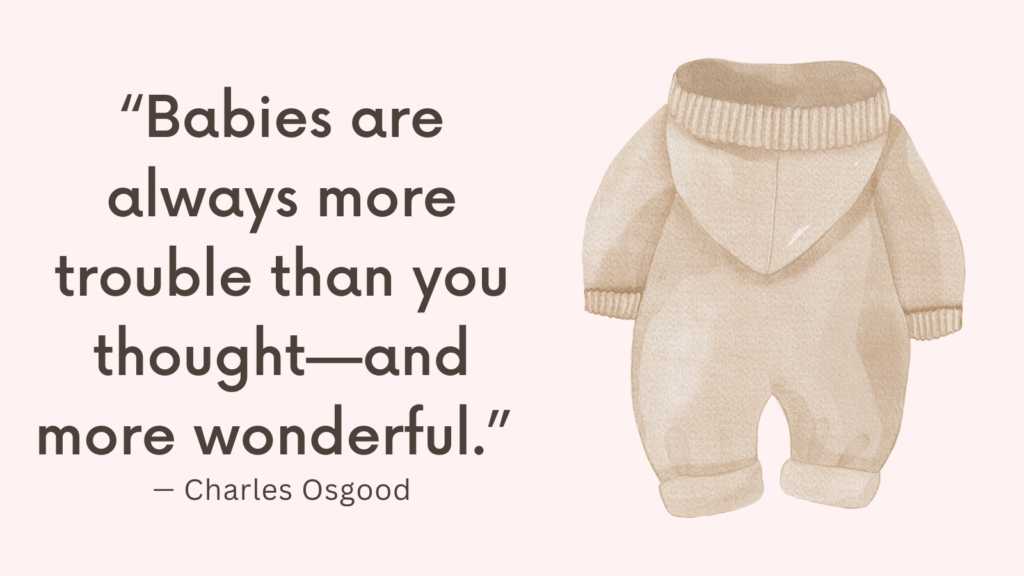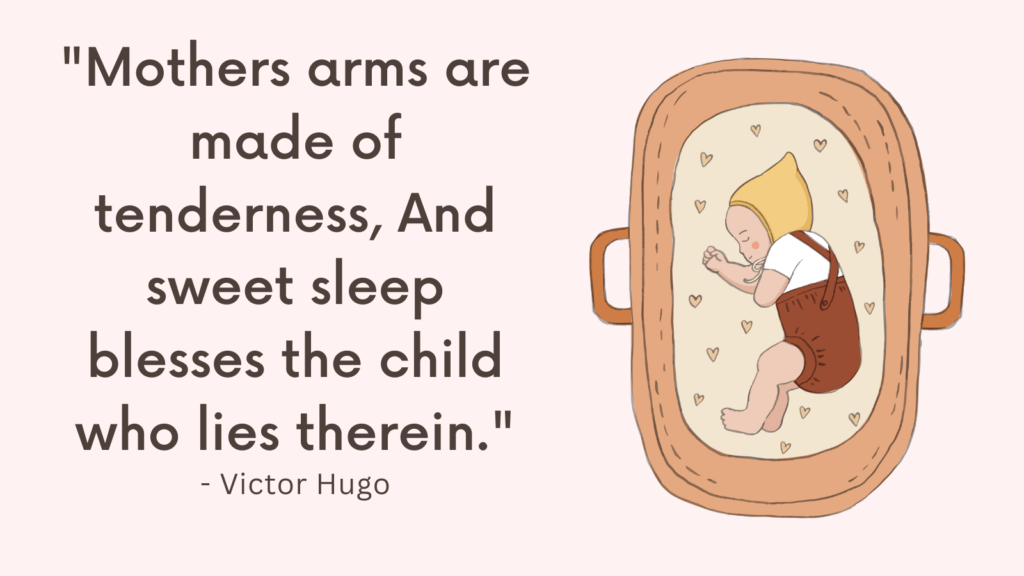In this post, you’ll learn how to deal with baby scratching his face.
Why Does Your Baby Scratch His Face?
Babies may scratch their faces for various reasons. Here are a few possible explanations:
1. Reflexes
In the first few months of life, infants have certain reflexes that can cause them to move their arms and hands involuntarily.
The Moro reflex, for example, can result in sudden arm movements, which may inadvertently lead to scratching their own face.
2. Self-soothing
Some babies scratch their faces as a way to self-soothe or comfort themselves.
They may find the sensation of scratching calming or enjoyable.
3. Skin irritation
Babies may scratch their faces if they experience any skin irritation, such as dryness, rashes, or allergies.
Itching can prompt them to scratch in an attempt to alleviate discomfort.
Related: Receiving Blanket vs Swaddle
4. Exploration
As babies start discovering their bodies and learning about cause and effect, they may scratch their faces out of curiosity.
This behavior allows them to explore the sensations and movements of their hands.
5. Teething
When babies start teething, they may exhibit increased hand-to-mouth activity.
In the process, they might accidentally scratch their faces while trying to alleviate teething discomfort.
Related: Top 7 Alternatives To Swaddling to Soothe Your Baby
How to Deal with Baby Scratching Face?
To help prevent your baby from scratching their face, here are some strategies you can try:
1. Keep nails trimmed
Regularly trim your baby’s nails using baby nail clippers or a gentle file.
Be cautious and take your time to avoid accidentally injuring their delicate skin.
2. Use scratch mittens
Put soft, breathable mittens or small socks on your baby’s hands to act as a barrier between their nails and face.
Ensure they fit snugly but not too tight to allow for proper circulation.
Related: Newborn Doesn’t Like Swaddle? Here’s What to Do Instead
3. Distract and redirect
Engage your baby in activities that divert their attention away from scratching.
Offer them toys, play gentle games, or gently stroke their face to provide an alternative focus for their hands.
4. Moisturize their skin
Dry skin can contribute to itching and discomfort.
Use a mild, fragrance-free moisturizer recommended by your pediatrician to keep your baby’s skin well-hydrated and less prone to irritation.
Related: 10 Best Books For New Moms
5. Check for skin irritants
Assess if there could be any potential irritants causing your baby to scratch, such as certain fabrics, detergents, or skincare products.
Avoid these triggers and opt for hypoallergenic options whenever possible.
6. Dress appropriately
Choose comfortable, loose-fitting clothing made of soft, breathable fabrics like cotton to reduce potential friction and irritation on your baby’s skin.
7. Maintain a cool environment
Overheating can make babies more susceptible to skin irritation and itchiness.
Keep the room temperature moderate and dress your baby accordingly to ensure they stay comfortable.
Related: Best 10 Newborn Care Books
8. Consult a healthcare professional
If your baby’s scratching persists, becomes severe, or you notice signs of an underlying skin condition, consult a pediatrician or dermatologist for a thorough evaluation and appropriate medical advice.
Remember to be patient and consistent with these strategies.
It may take some time for your baby to adjust their behaviors, but with your guidance and support, they can learn to minimize scratching and keep their face protected.
How to Stop Your Baby from Scratching Your Face?
If your baby is scratching your face, here are a few suggestions to help address this behavior:
1. Create a physical barrier
Place a soft, breathable barrier such as a receiving blanket or a small pillow between you and your baby’s hands when cuddling or holding them.
This can help prevent direct contact with your face.
2. Provide alternative objects
Offer your baby a safe and appropriate object to redirect their attention and satisfy their need to touch or explore.
For example, you can give them a sensory toy or a soft cloth to hold onto while you interact with them.
Related: When Do Babies Go From 2 Naps To 1
3. Use gentle reminders
If your baby starts scratching your face, calmly but firmly say “No” or use a gentle verbal cue to let them know that it’s not desirable behavior.
Avoid using harsh or loud tones, as it can startle or upset them.
4. Reinforce positive behaviors
When your baby refrains from scratching your face or engages in alternative activities, provide positive reinforcement.
Praise them gently, smile, or use simple words of encouragement, such as “Good job” or “Well done.”
5. Observe triggers
Pay attention to any patterns or triggers that may lead to the scratching behavior.
It could be related to overstimulation, hunger, fatigue, or discomfort.
Addressing these underlying factors may help reduce the urge to scratch.
6. Practice skin-to-skin contact safely
If you enjoy practicing skin-to-skin contact with your baby, ensure that their nails are appropriately trimmed or covered with soft mittens to prevent accidental scratching.
7. Model calm and gentle behavior
Babies often mimic the actions and emotions of their caregivers.
By demonstrating calm and gentle behavior yourself, you can help set a positive example for your baby to follow.
Related: My Baby Ignores Me When I Call His Name – Reasons & What to Do About It
Conclusion
Remember, each baby is unique. If you have specific concerns or questions about your baby’s behavior, it is always best to seek professional advice from a pediatrician.
FAQ
Why does my baby scratch his face while breastfeeding?
There can be several reasons why a baby may scratch their face while breastfeeding.
One possibility is that your baby’s nails are too long and may accidentally scratch their face while trying to find a comfortable position or while grasping onto your breast.
In this situation, regularly trimming your baby’s nails and ensuring they are smooth can help minimize scratching.
Another reason could be that your baby is experiencing discomfort or irritation during breastfeeding.
It is possible that they have sensitive skin or a skin condition, such as eczema, which can cause itching.
In such cases, it might be beneficial to consult with a pediatrician to evaluate any underlying issues and provide appropriate treatment.
Additionally, babies often use their hands and fingers to explore their surroundings, even while breastfeeding.
They may scratch their face out of curiosity or as a way to self-soothe.
This behavior typically reduces as they grow older and gain better control over their movements.
Related: How To Sleep Train For Naps?
Do babies rub their face when teething?
Yes, babies often rub their face when they are teething.
Teething is a process in which a baby’s teeth start to emerge through the gums.
It can lead to gum soreness, swelling, and discomfort, causing babies to seek relief by rubbing their face or chewing on things.
The pressure from rubbing or biting can help alleviate the discomfort temporarily.
In addition to face rubbing, teething may also be associated with other symptoms such as excessive drooling, irritability, increased biting or chewing behavior, and disrupted sleep patterns.
Providing appropriate teethers, chilled washcloths, or teething rings can offer additional relief during this period.
Related: Best 10 Sleep Training Books
Will my baby eventually stop scratching their face?
As babies grow and develop better control over their movements, they usually outgrow the habit of face scratching.
It is a temporary phase for most infants and tends to diminish over time.
However, consistent monitoring, prevention, and appropriate intervention can help expedite the process and reduce the frequency of face scratching.




